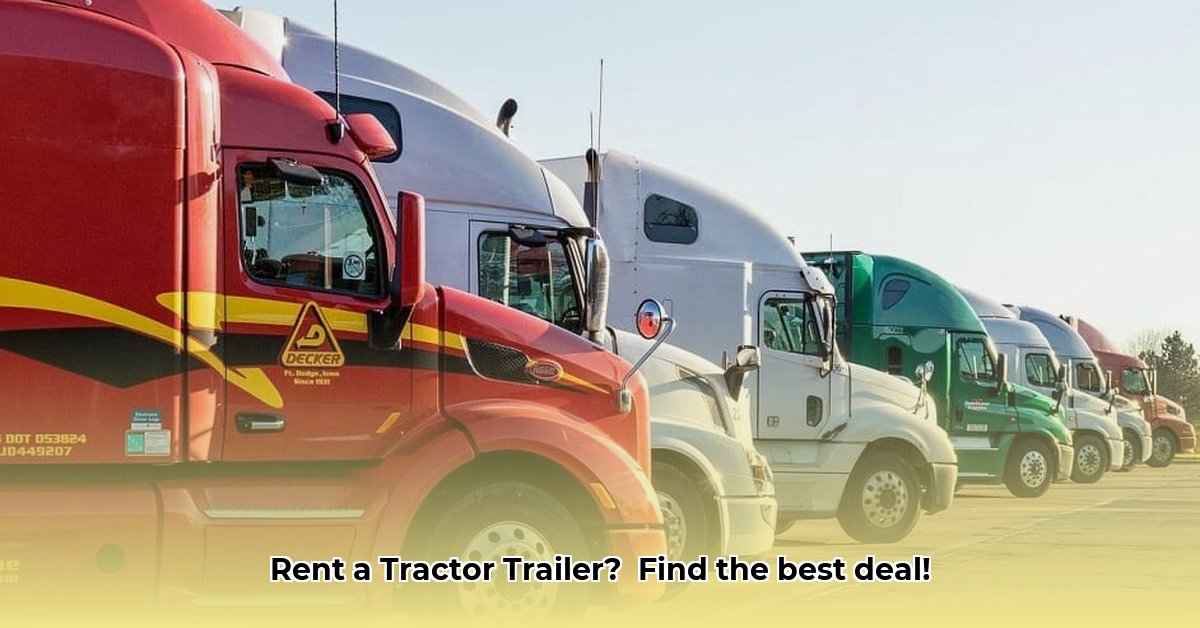
Finding the right tractor-trailer rental can feel overwhelming. This comprehensive guide compares different providers, outlining costs, trailer types, licensing, and the booking process to help you make an informed decision. For more cost information, see this helpful resource: Tractor Trailer Costs.
Can You Rent a Tractor Trailer? Absolutely!
Need to move a large load? Renting a tractor-trailer is a viable option, whether you're a seasoned trucker or a homeowner with a big move. However, the process isn't as simple as renting a pickup truck. Understanding the different rental options and their associated costs, licensing, and insurance requirements is crucial.
Choosing the Right Trailer: Size Matters
Before selecting a rental company, determine the size and type of trailer you need. This will heavily influence your choice of provider and associated costs.
Small Utility Trailers: Ideal for small moves, weekend projects, or hauling light materials. Often available at retailers like Tractor Supply Company 1, with short-term rental options and usually requiring only a standard driver's license.
Heavy-Duty Semi-Trailers: For large-scale moves or commercial use, these include dry vans, flatbeds, and refrigerated trailers. These are typically rented from larger companies like Penske and Ryder, requiring a Commercial Driver's License (CDL) and more comprehensive insurance.
Comparing Rental Providers: Penske vs. Tractor Supply & Others
The rental market offers diverse options, ranging from national chains to smaller, local businesses. Let's compare two popular choices:
| Feature | Tractor Supply Company (TSC)-like Rentals | Penske-like Rentals |
|---|---|---|
| Trailer Types | Small utility trailers | Dry vans, flatbeds, reefers, and other heavy-duty options |
| Rental Duration | Short-term (days to a week) | Short-term to long-term leases |
| Pricing | Generally lower for short-term rentals | Higher, varying greatly by trailer type and duration |
| Target Customer | Individuals, small businesses, DIY projects | Businesses, large-scale transportation, major moves |
| Licensing | Standard driver's license (often) | Typically requires a Commercial Driver's License (CDL) |
| Insurance | Basic liability insurance often sufficient | More comprehensive insurance typically required |
Need a quick, affordable solution for a small load? Tractor Supply-type rentals might suffice. Planning a large-scale move or commercial transportation? Penske-type rentals provide more comprehensive options, though at a higher price.
Rental Costs: Short-Term vs. Long-Term
Rental costs vary dramatically based on trailer type, size, rental duration, location, and season. Short-term rentals of small trailers from local providers are significantly cheaper than long-term leases of large semi-trailers from national companies. Always obtain multiple quotes.
Licensing and Insurance Requirements: Navigating the Legal Landscape
Legal requirements differ significantly depending on the trailer type and your location. Small utility trailers often only require a standard driver's license and basic liability insurance. However, larger semi-trailers almost always necessitate a Commercial Driver's License (CDL) and comprehensive insurance, often including cargo insurance. Check your state's Department of Motor Vehicles (DMV) website for specific regulations.
Renting a Tractor-Trailer: A Step-by-Step Guide
- Research & Compare: Explore different rental companies online, focusing on price, availability, and trailer types.
- Choose Your Trailer: Select the appropriate size and type for your specific needs, carefully considering weight and dimensions.
- Verify Licensing: Confirm that you hold the necessary driver's license (CDL or standard).
- Secure Insurance: Obtain appropriate insurance coverage, either through the rental company or your own provider.
- Book Your Rental: Reserve your trailer online or via phone, specifying pickup and return times.
- Pre-Trip Inspection: Thoroughly inspect the trailer before departure, noting any pre-existing damage.
- Safe Operation: Adhere to all traffic laws and regulations during transportation.
- Return & Final Inspection: Return the trailer and obtain confirmation of return condition.
Following these steps significantly increases the chances of a successful rental.
Finding Available Trailers: Location and Availability
Trailer availability varies significantly by location, rental company, and time of year. National companies like Penske usually offer broader online inventory tools and larger networks. Local rentals often have limited stock; calling ahead is essential.
The Bottom Line: Making the Right Choice
The best option depends entirely on your individual needs. Carefully consider the size and type of trailer required, budget constraints, licensing and insurance requirements, and rental duration to choose the most suitable provider. Prioritize safety throughout the entire process.